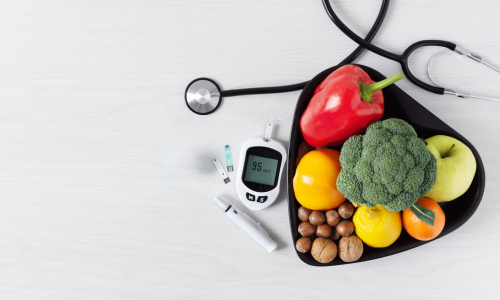What we do
Dietitians are qualified healthcare professionals who use nutrition science to help people make informed decisions about the food they eat and their lifestyle, both for promoting good health and improving symptoms of disease.
The Dietetic Service provides inpatient services to adults with a wide variety of nutritional needs at George Eliot Hospital, Warwick Hospital and Leamington Spa Hospital. We deliver evidence-based dietary advice to patients and their carers for many conditions, including the following:
- Diabetes
- Malnutrition
- Food Allergy
- Gastrointestinal and liver disorders
- Cardiovascular disease
- Obesity
- Nutritional deficiencies
- Tube feeding
As well as providing a service to inpatients, we also run numerous hospital-based outpatient clinics. Some of these clinics are run independently and some are run jointly as with multidisciplinary teams including diabetes and gastroenterology. Community visits can be arranged for people who are unable to attend out-patient appointments.
Our aim is to ensure that all our patients have a nutritionally healthy diet, that meets their individual needs and helps prevent disease.
As well as providing individualised patient advice, we also deliver group education sessions, training for professionals and have involvement in a number of health promotion projects.
Dietitians are regulated by the Health and Care Professions Council (HCPC) and are required to comply with the British Dietetic Association (BDA) Code of Conduct.
If you would like to learn more about the role of the dietitian and how we are regulated, click on the links below:
Inpatient services
If you have been referred to our service, a dietitian will complete an assessment on the ward and provide advice as necessary to you, your carers and health care staff.
Outpatient appointments
At your appointment, the Dietitian may request information on your usual dietary intake, weight history, medical history and current medications. The Dietitian may also wish to weigh and / or measure you. If you have mobility issues, please inform the Dietitian prior to your appointment as specialist equipment may be required.
The following would be useful to bring to the appointment:
- A 3 day food / symptom (if applicable) diary
- A list of any medications which you are currently taking
You may wish for a family member / friend / carer to accompany you to your appointment, especially if you do not do much cooking or shopping for food.
Home visits
Please ensure that someone will be there to let the Dietitian into your home or that details of how to gain access are provided. At your visit, the Dietitian may request information on your usual dietary intake, weight history, medical history and current medications. The Dietitian may also wish to weigh and / or measure you. If you have mobility issues, please inform the Dietitian prior to your appointment as specialist equipment may be required.
Our main office bases are in Nuneaton and Warwick.
We also run a number of outpatient clinics at a variety of locations:
South locations:
- Alcester - Alcester Primary Care Centre
- Bidford - Bidford Community Clinic
- Kenilworth - Kenilworth Clinic
- Leamington Spa – Brunswick Health Living Hub
- Shipston on Stour – Ellen Badger Hospital Out-Patient Department
- Southam – Southam Community Clinic
- Stratford – Stratford Hospital
- Warwick – Warwick Hospital
- Wellesbourne – Hastings House
North and Rugby locations:
- Atherstone – Atherstone Clinic
- Bedworth – Bedworth Health Centre
- Coleshill – Coleshill Clinic
- Nuneaton – George Eliot Hospital
- Polesworth – Polesworth Health Centre
- Rugby – Orchard Centre
Some specialist clinics are only provided at:
- Warwick – Warwick Hospital
- Stratford – Stratford Hospital
- Nuneaton - George Eliot Hospital
We run clinics for children at:
- Warwick – Warwick Hospital
- Stratford – Stratford Hospital
- Nuneaton - George Eliot Hospital
- Rugby - Orchard Centre
Our office bases are in Nuneaton and Warwick. Our office hours are Monday to Friday, 09:00 to17:00
For enquiries relating to Atherstone, Nuneaton, Bedworth and Rugby and surrounding areas please contact:
Dietetic Department, George Eliot Hospital, College Street, Nuneaton, CV10 7DJ
Tel: +44 (0)1926 600818 (option 3, North Warwickshire)
Fax: +44 (0)2476 865089
Main Hospital: +44 (0)2476 351351
For enquiries relating to Warwick, Leamington Spa, Stratford and surrounding areas please contact:
Dietetic Department, Warwick Hospital, Lakin Road, Warwick, CV34 5BW
Tel: +44 (0)1926 600818 (option 3, South Warwickshire)
Fax: +44 (0)1926 482642
Email: dietitians
Referring patients
We accept referrals from health professionals for patients who meet our referral criteria. Please download our Word referral form or PDF referral form. If you wish to discuss a referral with us please contact the relevant department base to speak with a member of staff.
If you are referring a home enteral feeding patient, please complete our Word HEF form.
If you are referring a patient in a care home, please use the care home referral form.
Information if you require advice and support to lose weight and do not meet our referral criteria.
Information for prescribers
The Coventry and Warwickshire oral nutritional supplement (ONS) prescribing guidance recommends the procedure for the identification and treatment of malnutrition in the community to ensure Oral Nutritional Supplements (ONS) are prescribed appropriately in Coventry and Warwickshire. It also gives guidance regarding the provision of oral nutritional supplements to patients on discharge from hospital back into the community. The guidance is currently being revised so is not available at this time.
Most people living with a dementia need to follow general healthy eating advice. You will find leaflets about this under the category ‘healthy eating’ which can be found below.
We also recommend that people living with dementia take a supplement of vitamin D. Find out more about vitamin D.
Some people can experience problems with eating and drinking. These local leaflets provide information to help:
- Someone who is losing weight unintentionally.
- Someone who prefers eating with their fingers rather than cutlery
- Someone who is experiencing taste changes
If you are concerned about unplanned weight loss, you can check if this is a cause of concern by completing this self-screening tool.
You can also find out more information about food and dementia from these national sites:
More information about local services for people living with dementia
- Dietary Advice for Gestational Diabetes
- Healthy Eating with diabetes
- Diabetes and endocrinology
- Diabetes UK
- Dietary advice for polycystic ovary syndrome (PCOS)
- Hypoglycaemia
- The Glycaemic Index
- NHS Healthy living for people with Type 2 diabetes (E-Learning)
- Type 2 diabetes structured education - DESMOND
If you have been losing weight unintentionally, the BAPEN self-screening tool will help identify if you are at risk of becoming malnourished.
The following leaflets provide simple suggestions to help stop further weight loss:
- Make your diet more nourishing
- Make your diet more nourishing the healthier way (for patients with a history of heart disease or diabetes)
- How to look after your teeth on a high sugar diet
- Nourishing Snacks
- Nourishing Drinks
- Nourishing Meals
- Now your appetite has improved
- Recipes for Nourishing snacks and drinks
If you are struggling to get to the shops for food, the following leaflet may help. You may also wish to consider purchasing meals from one of the providers below:
For more information about malnutrition, the following may be of interest:
- Eating for Health partners
- Warwickshire County Council
- Warwick District Council
- Nuneaton and Bedworth Borough Council
- North Warwickshire Borough Council
- Rugby Borough Council
- Stratford-on-Avon District Council
- UK physical activity guidelines
We collect feedback from patients on a regular basis to learn what we are doing well and how we can improve.
Warwickshire standards for the promotion of good nutrition & hydration for adults receiving care have been launched. Guidelines have also been developed to provide a practical tool for implementation of the standards, with one version written specifically for care homes and another for other care providers.
The standards have been written through partnership working with health, social care and other partners from across Warwickshire. The aim is that excellent nutrition and hydration in both the community and care homes will be everyone’s business, ensuring a consistent approach; with everyone having access to high quality nutrition and hydration.
Please click on the tabs below for more information.
Please see below for links to useful documents and websites during COVID-19
These standards have been developed in Warwickshire because a need to improve nutrition and hydration standards and services in care homes has been identified by staff, residents, and families. To meet the key aims of the standards it is recommended that managers and staff in residential care settings complete a self-assessment exercise.
Useful documents
Coventry and Warwickshire's system weight management group have developed local weight management pathways for health professionals to raise awareness of the choices of services available and support and make referrals. The pathways include services for children and adults from universal support through to more specialist support.


